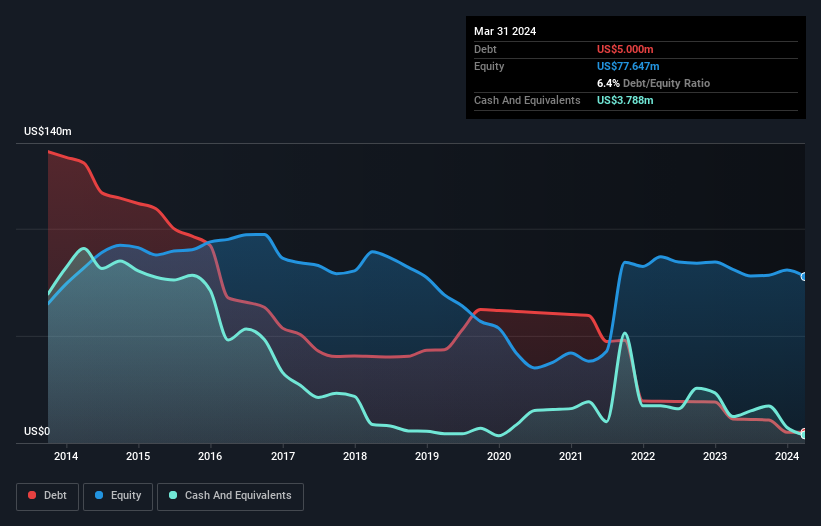- United States
- /
- Healthcare Services
- /
- NasdaqGS:PHLT
Performant Financial (NASDAQ:PFMT) Is Carrying A Fair Bit Of Debt
Warren Buffett famously said, 'Volatility is far from synonymous with risk.' It's only natural to consider a company's balance sheet when you examine how risky it is, since debt is often involved when a business collapses. Importantly, Performant Financial Corporation (NASDAQ:PFMT) does carry debt. But should shareholders be worried about its use of debt?
When Is Debt A Problem?
Generally speaking, debt only becomes a real problem when a company can't easily pay it off, either by raising capital or with its own cash flow. Part and parcel of capitalism is the process of 'creative destruction' where failed businesses are mercilessly liquidated by their bankers. However, a more common (but still painful) scenario is that it has to raise new equity capital at a low price, thus permanently diluting shareholders. Of course, debt can be an important tool in businesses, particularly capital heavy businesses. When we examine debt levels, we first consider both cash and debt levels, together.
Check out our latest analysis for Performant Financial
How Much Debt Does Performant Financial Carry?
You can click the graphic below for the historical numbers, but it shows that Performant Financial had US$5.00m of debt in March 2024, down from US$11.2m, one year before. However, it does have US$3.79m in cash offsetting this, leading to net debt of about US$1.21m.

How Healthy Is Performant Financial's Balance Sheet?
According to the last reported balance sheet, Performant Financial had liabilities of US$12.4m due within 12 months, and liabilities of US$9.19m due beyond 12 months. On the other hand, it had cash of US$3.79m and US$26.2m worth of receivables due within a year. So it actually has US$8.36m more liquid assets than total liabilities.
This surplus suggests that Performant Financial has a conservative balance sheet, and could probably eliminate its debt without much difficulty. Carrying virtually no net debt, Performant Financial has a very light debt load indeed. There's no doubt that we learn most about debt from the balance sheet. But it is future earnings, more than anything, that will determine Performant Financial's ability to maintain a healthy balance sheet going forward. So if you're focused on the future you can check out this free report showing analyst profit forecasts.
Over 12 months, Performant Financial reported revenue of US$115m, which is a gain of 7.0%, although it did not report any earnings before interest and tax. We usually like to see faster growth from unprofitable companies, but each to their own.
Caveat Emptor
Importantly, Performant Financial had an earnings before interest and tax (EBIT) loss over the last year. Indeed, it lost US$6.3m at the EBIT level. Looking on the brighter side, the business has adequate liquid assets, which give it time to grow and develop before its debt becomes a near-term issue. Still, we'd be more encouraged to study the business in depth if it already had some free cash flow. So it seems too risky for our taste. The balance sheet is clearly the area to focus on when you are analysing debt. But ultimately, every company can contain risks that exist outside of the balance sheet. For example - Performant Financial has 1 warning sign we think you should be aware of.
If you're interested in investing in businesses that can grow profits without the burden of debt, then check out this free list of growing businesses that have net cash on the balance sheet.
New: Manage All Your Stock Portfolios in One Place
We've created the ultimate portfolio companion for stock investors, and it's free.
• Connect an unlimited number of Portfolios and see your total in one currency
• Be alerted to new Warning Signs or Risks via email or mobile
• Track the Fair Value of your stocks
Have feedback on this article? Concerned about the content? Get in touch with us directly. Alternatively, email editorial-team (at) simplywallst.com.
This article by Simply Wall St is general in nature. We provide commentary based on historical data and analyst forecasts only using an unbiased methodology and our articles are not intended to be financial advice. It does not constitute a recommendation to buy or sell any stock, and does not take account of your objectives, or your financial situation. We aim to bring you long-term focused analysis driven by fundamental data. Note that our analysis may not factor in the latest price-sensitive company announcements or qualitative material. Simply Wall St has no position in any stocks mentioned.
Have feedback on this article? Concerned about the content? Get in touch with us directly. Alternatively, email editorial-team@simplywallst.com
About NasdaqGS:PHLT
Performant Healthcare
Provides audit, recovery, and analytics services in the United States.
Excellent balance sheet with moderate growth potential.
Similar Companies
Market Insights
Community Narratives




